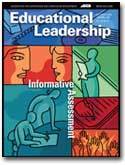Your check is in the mail. This won't hurt a bit. Will this be on the test?
Do these lines make us wince because we hear them so often, or because each hints at a possibility that we would rather not admit? The check is not (yet) in the mail. Yes, this will hurt, and possibly quite a bit. And, yes, of course this will be on the test, or I wouldn't be teaching it.
Of course, educators have purer reasons for dreading their students' most frequently asked question. They know that the skills and knowledge they impart are important for their students' futures, and they know their students could gain so much more if they came to see the value of long-term learning.
But in these days of excessive test preparation, the question—Will this be on the test?—just doesn't go away.
Enter the term "formative assessment," a term almost guaranteed to puzzle the lay public and even many of us who did not deeply study assessment as teachers in training. Those who equate all assessments with tests misunderstand the meaning of formative assessment, and those who sell "formative" tests that prepare students for other tests preempt its meaning.
Formative assessment, rephrased for clarity as informative assessment, is classroom activity—from quiz to question, discussion to observation, learning task to student feedback—that informs teachers about their students' learning and their own teaching. It is at the heart of teaching for long-term learning.
Robert Rothman (2006) describes the differences between the two major kinds of assessment, summative assessment andformative assessment. Summative assessment is directed at answering a key question—Do you understand?—with a yes or no answer expected. The questions are asked at the end of a unit of instruction, and the results are often analyzed months after the students have moved to another grade. In formative assessment, the key question is, Whatdo you understand? Both teachers and students pose this question on an ongoing basis and use the answers to adjust instruction and learning strategies accordingly. As Stephen and Jan Chappuis tell us,Even though assessments will continue to be labeled formative or summative, how the results are used is what determines whether the assessment is formative or summative. (p. 15)
It is this formative assessment that research concludes has a significant effect on student achievement, according to Dylan Wiliam. Wiliam references five reviews of research synthesizing a total of more than 4,000 studies undertaken during the last 40 years. Their conclusion is clear:When implemented well, formative assessment can double the speed of students' learning. (p. 36)
Thomas Guskey (p. 27) reiterates the point, "Done properly, formative assessment can generate dramatic improvements in teaching and learning." But, he emphasizes, what happens afterward—how the teachers use the information gleaned about both the teaching and the learning—is the rest of the story.
Formative assessment is neither a tidy process nor an easy instructional strategy. To learn how to do it, one must set out on a journey. In "Learning to Love Assessment" (p. 8), Carol Ann Tomlinson describes her own evolution as a teacher.
"It was [my] 10th understanding that revolutionized what happened in [my] classroom," she writes.I finally began to grasp that teaching requires a plural pronoun. The best teaching is never so much about me as about us. I began to see my students as full partners in their success.
When our students understand that we value their learning more than their test scores, then, maybe—just maybe—they will stop asking the short-sighted question and embark on their own learning journeys.


